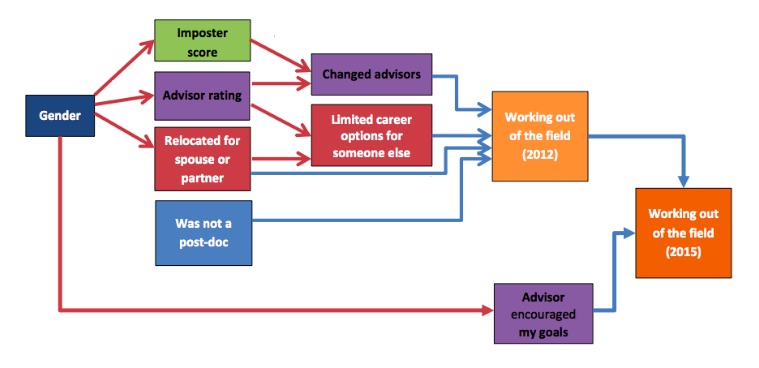Title: Three years later: gender differences in the advisor’s impact on career choices in astronomy and astrophysics
Authors: Rachel Ivie, Susan White, and Raymond Y. Chu
First Author’s Institution: American Institute of Physics, One Physics Ellipse, College Park, Maryland, 20740, USA
Status: open access
Although the number of women in astronomy has increased over time, the field remains dominated by men. This isn’t because women are less interested in astronomy. In high school, physics and astronomy classes are about 50% female, but at every career transition women are more likely than men to leave the field. Women earn only about 30% of astronomy bachelor’s degrees, and the percentage continues to decrease at every career stage. Today’s paper presents the results of a longitudinal research study that has tracked a group of PhD students over several years as they transition to different careers. The study’s purpose was to try to pin down some of the reasons why people leave the field, such as imposter syndrome, poor advising, or accounting for the career of a spouse or partner. They identify which of these issues has a significant effect on the decision to leave the field, and in particular which issues have a stronger effect on women. With this information, we can work to make changes within the astronomy community to make it easier and more appealing for women and other underrepresented groups to continue in astronomy.
The Longitudinal Study of Astronomy Graduate Students (LSAGS) consisted of three surveys sent to the same group of participants over an eight year period (in 2007, 2012, 2015). The purpose was to collect information on the participants’ experiences and to look for statistically significant differences between those who continued within the field of astronomy and those who chose to leave the field. The participants were all PhD students in the 2006-07 academic year, and the same group was contacted for each of the three surveys. 2056 participants were contacted, the first survey received 1143 usable responses, the second 837, and the third 814. 465 participants responded to all three surveys.
The three factors addressed in the surveys were imposter syndrome, advisor’s attitude and encouragement, and the “two-body problem.”
Imposter Syndrome: Imposter syndrome is defined as “believing that one’s accomplishments came about not through genuine ability, but as a result of having been lucky, having worked harder than others, and having manipulated other people’s impressions.” In short, it is the feeling that you do not truly deserve your successes and that you do not belong.
Advising: LSAGS evaluated the quality of advising by asking participants whether their advisors were “helpful, encouraging, easy to discuss ideas with, and gave adequate input,” whether they had additional mentors, and whether their advisors supported them in the pursuit of their goals.
Two-Body Problem: The “two-body problem” refers to the difficulty of a couple finding two careers (often two academic careers) in the same location. This is a problem that disproportionately affects women, in part because they are more likely to have partners who are also academics. In fact, the paper cites a study that found that the primary reason that women turned down academic jobs was that their partners failed to find a job in the same location.
The LSAGS survey found that women were significantly more affected by imposter syndrome, tend to have worse relationships with their advisors, and were significantly more likely to have relocated for a partner’s career or to have lived apart from their partner for the purpose of work or study. They also found that all of these factors contribute to attrition from astronomy.
More precisely, the primary indicators of whether a respondent was working outside of astronomy by the final survey was “encouragement from one’s advisor to attain goals,” and whether they were already out of the field by the second survey. The direct indicators of whether a respondent was out of the field by the second survey were “changing advisors, not taking a postdoc, relocating for a spouse or partner, and limiting career options for someone else.” Many of these factors showed a strong correlation with gender. In fact, the only relevant factor that did not show a correlation with gender was whether the respondent had ever been a postdoc. Figure 1 shows the relationship between gender, each of these factors, and whether a respondent had left the field by the second or third surveys (2012 and 2015, respectively).

Figure 1. This flowchart shows the relationship between gender, various factors addressed by the surveys, and whether a respondent was still working in astronomy by the second or third surveys. For example, women are more likely to have a high imposter score, which makes them in turn more likely to have changed advisors, and more likely to be working outside of the field by the second survey. The color of the arrows indicates a direct (blue) or indirect (red) factor. (Source: Figure 3 in the paper.)
The LSAGS study shows that many of the factors that lead to attrition from astronomy disproportionately affect women. Women are more likely to have a two-body problem, to experience imposter syndrome, and to receive insufficient advising. In particular, the study found that good advising directly contributes to continuing in the field. Even years after graduation, respondents indicated that quality of advising had a significant and direct effect on whether they remained in the field. The results of the LSAGS study indicate steps we can take to improve the field of astronomy. Advisors should be trained to support their students and to encourage them to achieve their goals, and institutions should continue to work to provide solutions to the two-body problem.
It is important to note, however, that this study addressed only one component of a student’s identity and allowed only for a binary male or female gender, thereby excluding respondents with all other gender identities. It is a first step towards recognizing the factors that lead to attrition from astronomy and that preferentially affect one underrepresented group. However, it is important to keep in mind that all of these factors likely even more strongly affect people with other gender identities, as well as women who also fall into other underrepresented groups. To fully understand the problem of bias in attrition within our field, we must build upon studies like these and continue to examine factors that prevent people of all identities from choosing to pursue careers in astronomy.



